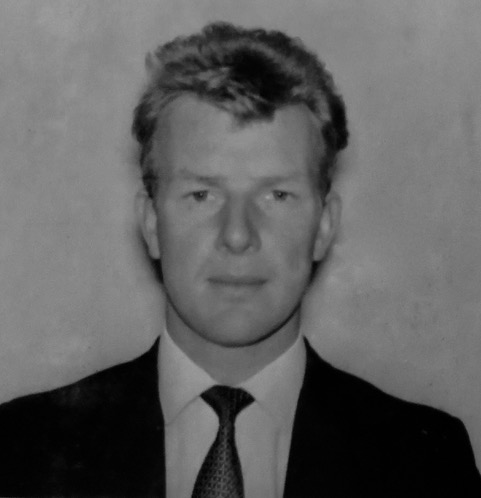
My interview for the Bermuda Police was held at the end of June 1959. The interview was held at the Crown Agents in a building close to the Houses of Parliament in London. There were 3 people interviewing me, one being the Deputy Commissioner of Police in Bermuda called Maxie Parker, and the other 2 were people I did not know. The interview went well but in my opinion the thing that got me the job in Bermuda was when I was asked about what I did in the British Army in Paris where I spent almost all of my 2 years National Service.
I was going to answer “mainly played football, sir” but something made me avoid this. I said I am very sorry sir I cannot tell you as I was cleared as "cosmic top secret" and one of the conditions was not to mention my activities at SHAPE.
Max Parker exclaimed in his pukka English accent, “my god did you hear that. This young man worked at NATO headquarters and was cleared cosmic top secret.” I think that was why I got the job as a policeman in Bermuda. Around 1985 I was very friendly with a captain in the Canadian Navy who asked me if I was interested in seeing their navy at work. I said yes and he said he could check my security record (I did not know I had one). Anyway I was still cleared "Cosmic Top Secret" almost 30 years later.
A few days after my interview, in late July 1959, a letter came and said I had got the job and to report to the London Police Training College at Hendon where I would be trained as a policeman, and if I passed I would go to Bermuda and enrol as a constable in the Bermuda Police. My parents must have been shocked and devastated.
The 3 months at Hendon Police College was a highly enjoyable experience. For 3 months I studied hard and came out top of my intake of about 100 new recruits. I really enjoyed studying and I found I had a talent in writing exams – something I had not done when I was at school in Perth although I came out pretty high in the exams in the army.
On the 11th of November 1959 I arrived in Bermuda as a police constable in the Bermuda Police Force after a tearful goodbye to my parents in Perth. Goodness knows what they thought – and to my shame I hardly considered their feelings. Men are like that at 20 or 21.
Bermuda at first sight was wonderful. Clear seas, nice roads, nice people – when I was met at the airport by a police car (a Sunbeam Talbot) driven by PC Pip Carter, he said to Bill Smith and me (also a new recruit – Bill by the way ended up as a major in the Canadian military) that Bermuda was a great place and we had made the right decision. This was re-assuring. CLICK HERE to read Bill Smith's article in our "Then and Now" column.
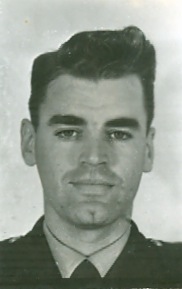 P.C. Bill Smith
P.C. Bill Smith
We went to the police barracks in Prospect – a single room in an old British army building – unpacked and got changed for dinner. One of the qualifications for the Bermuda police was to be of unquestioned sobriety. I thought that my alcoholic drink on the plane would be the last I would have for 3 years – the length of my contract.
Entering the police bar at the police club in Prospect was quite an experience. Beer flowed, someone was playing the piano (it was Alastair "Shakey"Johnson) and community singing was taking place. It was crowded with young policemen and their girlfriends. I stayed in the bar until around 11 pm – it closed at 1 am – and went to sleep in a new country.
The next day I got my uniform – navy blue jacket and trousers. We were in winter uniform and shorts would not be worn until May. We spoke with an inspector (Tug Wilson) who gave us vague information about Bermuda and told us to report the following day, at 11.45pm for our first day (or night) on the job. I was assigned to PC Jimmy Jones – who was black – and the first thing we did was to go a bar on Reid Street for a beer before it closed. The second was to visit ZBM radio station which was on Bermudiana Road. I was introduced to the disc jockey – Quinton Edness who later was in the Bermuda Cabinet in the 1970s – and who introduced me over the air as a new recruit and played an Ella Fitzgerald song for me over the air. For me this was heady stuff.
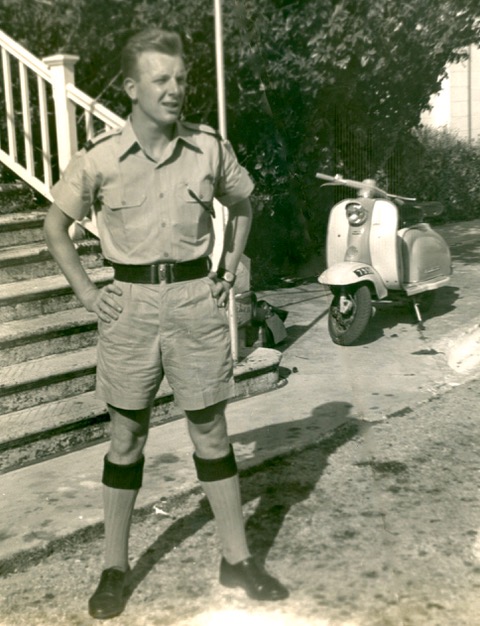 Young P.C. Bob Stewart
Young P.C. Bob Stewart
Nothing much happened during my first night, and I went up the Police barracks for breakfast and then bed. I was wakened around 3pm by someone who asked if I wanted to go football training. I was then at home in Bermuda, and even more so when I went football training. The police had a good football team and they needed some new players. I played my first game at the BAA field for Police against Ramblers and I played a good game. Some of the players who played for police were Arthur Rose, Alan Harker, Barry King, George Linnen, Clive Donald (who later became Commissioner of Police), Jim Lyons, and John Allan.
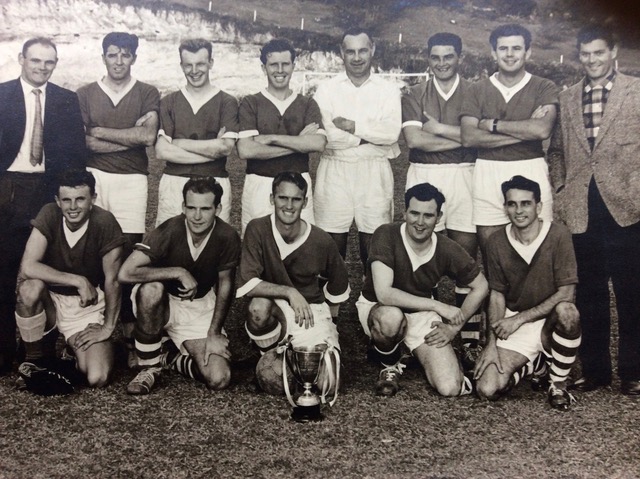
The following week I played another game and was regarded as a strong addition to the football team. After playing for a few games, I was selected to play for the Bermuda Football Combination team (the football leagues were racially segregated) and I played in the white league. We played against the black Bermuda Football League – but I do not remember the score – but I do remember being mentioned on radio and television as a valuable recruit to Bermuda football. On Xmas day 1959 I was selected to play for the Bermuda Football Association team – essentially the national team although that term was not used then. I played a great game against a visiting team from Toronto and I played every game for the BFA until I left the police force.
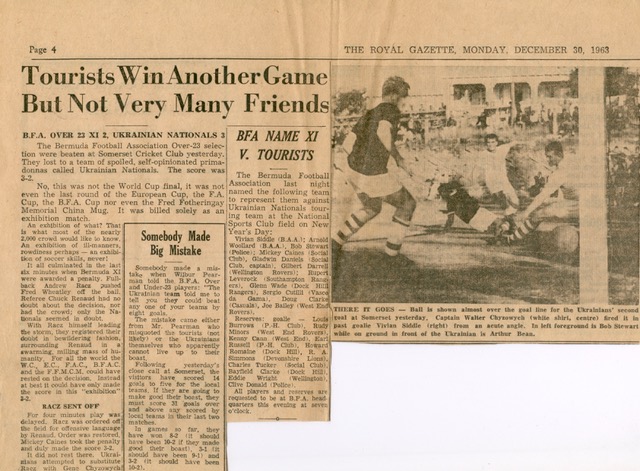
After a short period, I was regarded as one of the best football players in Bermuda and in subsequent years I played against such teams as Glasgow Celtic, West Bromwich Albion, and visiting Canadian and American teams. I played against two of the world’s best players – Stanley Matthews and Tom Finney. I became well known and I enjoyed the sporting spotlight.
The photo below was taken during a BFA Match v Toronto City Football Club on 12th May 1962, with the great England winger,Tom Finney, playing as a guest player for Toronto F.C. The caption below is taken from the Royal Gazette report on the game.
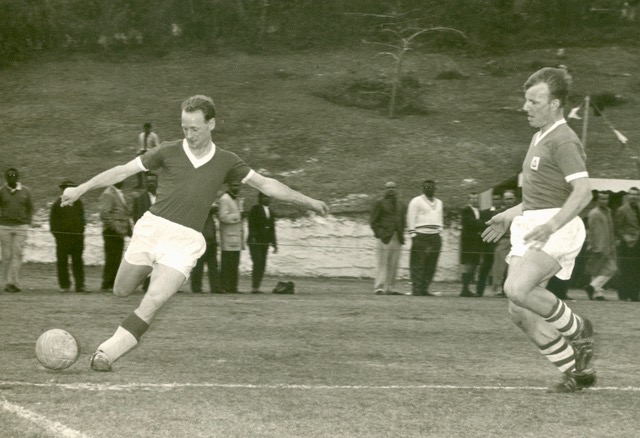
I really enjoyed the police. My first year was on the beat in Hamilton working 8 hour shifts, 6 days per week, rotating between days, evenings and nights. It was good fun although working nights in a very quiet Hamilton was not too exciting. I also lived at Admiralty House near Spanish Point where the other residents were Mike Kelly, Jack Shaugnessy, John Allan, and Bill Pratt. We had to move out in 1963 when the Bermuda Regiment took over Admiralty House grounds. I got married shortly thereafter to Judith Matthews.
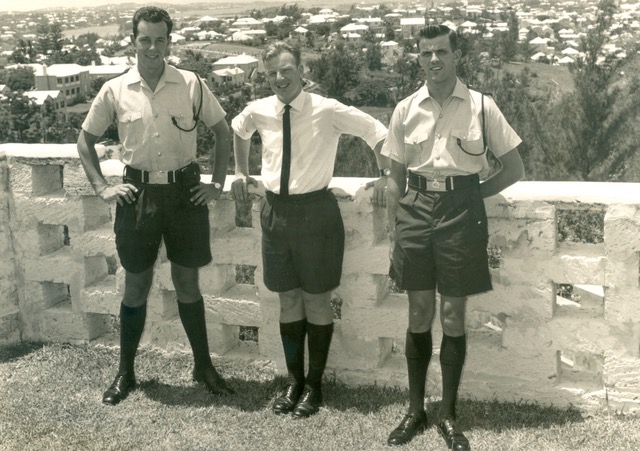
After a year I was transferred to the serving of warrants, mainly for debts and for those who failed to pay for the upkeep of illegitimate children or wives. I worked with Pc Pat Maclaughlin. In many cases a number of male Bermudians fell into all 3 categories – in addition, many of them were petty criminals so I became a great source of information for the Criminal Investigation Department (CID). I did that job for a year – most of 196l – and at the end of that year I had completed 2 years’ service – that meant I could go on leave as we were not allowed leave until completion of 2 years’ service. The leave was 9 weeks per year which meant I had 18 weeks to do what I wanted.
This was my first visit to the USA and it, together with Judith my girl-friend whom I had met at a police party in Prospect, changed my life forever. I went all over the States starting in New York and then on to see my Aunt and Uncle, Margaret and George, who lived in up-state New York near Ogdensburg. They had emigrated to America after the second world war during which he was wounded.
We went all over the place and into Mexico and up to Canada on Greyhound buses which sold a ticket for 99 days for $99 – which meant you could go wherever they drove. It was an incredible experience which I will not bore you with except for one critical issue.
After 2 months on my own, and meeting many different people in the US, I realized slowly and belatedly that if I did not get an education I would never amount to anything. I had no qualifications except my youth and athletic abilities. I was going nowhere.
Towards the end of my trip, in a place called Port Angeles, Washington State I went to a book store and bought a book on French grammar. I could speak a little French because of my 2 years in Paris but I had forgotten most of it – I also had 3 years French when I was at Perth Academy. On the ferry to Vancouver in Canada, and on Greyhound buses back to the East Coast of USA, I read this book and quite enjoyed it. I actually enjoyed studying.
When I returned to Bermuda, I spoke with a couple of policemen who were studying for their GCE by correspondence course. Some went on to be lawyers and accountants. Judith, my girl-friend who was a teacher, encouraged me to study, and with a steady girl-friend I no longer went to drinking parties as I had in the past. I then became a serious student – a wise decision for someone in his early 20s. I later married Judith in 1963 a couple of weeks before I sat several 'A' level exams.
Between 1962 and 1964, I passed examinations in English, Maths, French, British Constitution, Economics and History. I ended up with 4 ‘A’ levels, and 5 ‘0’ levels. I studied mostly in the evenings by correspondence courses, but when I returned from leave in the USA, the Police transferred me to CID (because of my local knowledge) in the Scenes of Crime Department which at that time was headed up by Supt Richard (Dickie) Fielders. This meant I had a desk and as I had a gift for admin I took charge of criminal records. This gave me lots of time to study whilst at work although it looked as though I was working. The other colleagues in CRO were Mike Wood (something of a madman), John Logan, Ronnie Mullan, Leslie Waddell, and the officer in charge Inspector Johnny Mullen.
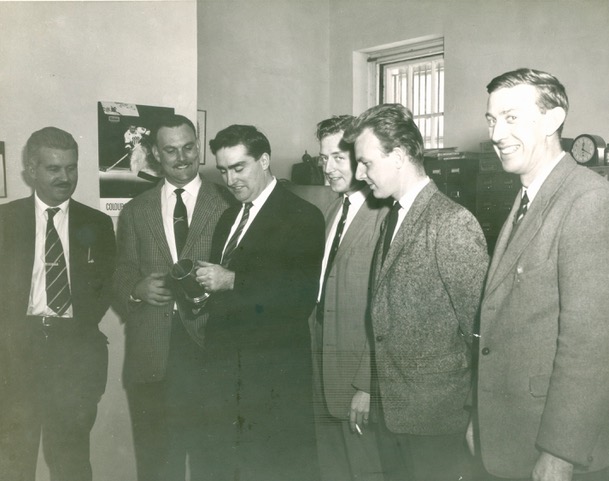
The Department of Education was impressed by my studies, and Mr Graham Rosser helped and encouraged me. I then decided to apply for a scholarship from the Bermuda Government to study to be a teacher. Everyone thought I was going to be a physical education teacher because of football, no one even guessed that I was going to study economics and history.
I had decided on economics because I liked it, but also because I thought it would open doors other than just teaching. I was right.
I was awarded a scholarship, and I left Bermuda in August 1964 to begin my 3 years of study at Dudley Training College (now Wolverhampton University) – close to Birmingham and Wolverhampton in England.
My scholarship from the Bermuda Government provided me with £500 per year, and my wife Judith got a job teaching in Dudley. We were not rich, but not poor either. Rover, our dog, came with us although he had to go into quarantine for 6 months and we visited him every weekend until that was over. He was a fantastic dog.
The college also had an arrangement with the University of London whereby I could write their exams in addition to the exams at Dudley. I was the first person at the college to do 2 courses at the same time and pass them. I graduated with distinctions from Dudley, and with an honours degree from University of London in 1967.
During my 3 years in England as a student, I rarely had a drink and I studied virtually every day which I grew to love and even today hardly a day goes by without me reading some serious book on economics or history. I have a huge library in Bermuda and in South Carolina.
I enjoyed being a student and studying, and I enjoyed England, even entertaining the idea of not going back to Bermuda and staying there. I was also captain of the College football team for 2 years – football has played a big part in my life.
The terms of my scholarship were that I had to return to Bermuda, teach for 3 years, or return the costs of my scholarship. We did return, not only with Rover but with a new baby called Iain, who was born on 19 July 1967 only a few days before I learned of my examination successes.
I returned to Bermuda in August 1967 to begin my teaching career and Judith returned 3 weeks later with baby Iain. Bermuda was again our home.
Returning to Bermuda after UK was a little difficult. I was no longer a football star (I was 29), my new job meant new people, life was more expensive, getting accommodation was difficult. But such problems were not unique. It was a big change in life and pace.
I started to teach at Whitney Institute in Smith's Parish just next to Flatts Post Office. There I taught history, mathematics and a few general subjects. Teaching there was not too much fun but it had its moments. My subject was really economics not maths.
Shortly after I started teaching a new Commercial Sixth Form Centre was established which meant I could teach commerce and economics although there were not many students – about 6 as I recall. In addition, a new Academic Sixth Form Centre to teach Advanced level GCE was also established and there I was able to teach economics at a fairly high level. The students were very good – much better than Whitney – and I thought that things would turn out to be OK.
Alas, that was not the case, mainly because the Department of Education was not capable of sound administration and the head of the Academic Sixth Form Centre was incompetent – at least in my opinion.
Nevertheless, for the first year I was quite content with being a teacher although my pay was not very good – a reasonable salary was needed because Bermuda was expensive and I had a wife and child to support. All in all it was better than being a policeman, although I still had many friends in the police, and I still played football for the police, and later in the commercial league. I also played tennis for police, my main partners being Oliver Bain and Phil Birmingham.
Another feature of police social life in the early 1960s was the police poker club. Members included Alastair Johnson, John Morris, Eric Simpson, Mike Leng, Dennis Byrne, Jim Maitland, Alex Hunter, Mike Kelly, Paul Wakefield, and Nobby Clark, We played in the police barracks, including Admiralty House, usually on a Friday and Sunday. The stakes were modest, but a player could easily lose a week's pay. A poker school usually comprised of about 5 - 8 players and we would play until the early morning. On a number of occasions some players started after late shift (midnight) and sometimes went straight on duty for day shift at 8 am. I remember Dennis Byrne doing that.
While at the Sixth Form Centre I taught evening classes in economics for those who wanted to go into banking, commercial firms and international business. All in all I was reasonably content.
My knowledge of economics was useful in another respect. In November 1967, the UK devalued the pound from $2.80 to a dollar, to $2.40. At that time the Bermuda pound was tied to the British pound. Everyone in Bermuda therefore took a cut in pay of about 15%. I then wrote my first letter to the editor of the Royal Gazette stating that this did not make any economic sense and that ordinary people were bailing out the banks whose assets were largely in sterling and who would also have to take a cut in the value of their assets of 15%. My letters created quite a stir and all of a sudden I was regarded as something of a celebrity (and a pain in the neck). Please check the old Royal Gazettes in the Bermuda Library from November 1967 onwards.
I made friends with many politicians – especially Dr Stanley Ratteray (who later became Minister of Education) – and many senior civil servants like Dr Walwyn Hughes.
Later I gave evidence to a Commission set up to examine why devaluation took place (chaired by Sir John Swan), and also to a riot commission in 1969. I was quoted in the Wall Street Journal, Financial Times and Fortune Magazine (who sent a reporter from the USA down to interview me). All of a sudden I was no longer a policeman or even a teacher but someone whose views were sought after – although rarely acted on.
I was also elected to the executive of the Amalgamated Bermuda Union of Teachers (ABUT) in 1968 and sat on the executive committee and was a member of the salary negotiating team. It did not take long for me to become disillusioned with trade unions particularly after there was a teachers’ strike in 1968.
I did not like being on strike, I did not like the attitude of many on the executive of the ABUT, and I did not see any future for me in teaching. Nevertheless, I was appointed to the union negotiating team with the Bermuda Government.
It soon became apparent that there was not going to be any changes for the better in education, that the pay was going to continue to be low, and that many of the changes being contemplated in education would mean a dumbing down of standards. This meant that 'A' levels were likely to be phased out as they were considered elitist (translation they were too difficult for many Bermuda students and the politicians wanted to be seen as being progressive in terms of education).
By then it was late 1968 but I could not change jobs because I was not Bermudian. I applied for Bermuda status and was granted it in May 1969. Had I come to Bermuda 10 years later it would been unlikely for me to be able to be Bermudian. My timing was excellent.
When I had my interview for status in 1968, the teachers were on strike and I had been on television criticizing the government. One member of the panel (Hacky Davis) asked I had any difficulty getting away from school that day to attend the interview. I then foolishly said that if it was a waste of time doing the interview we could end it there and then. Fortunately, for me a black newspaper sports reporter for the Mid-Ocean News (whose name I forget) said no, because he wanted to ask my opinion of how local football was doing and had I seen any difference after being away for 3 years. The interview then went well and a few weeks later I was given Bermuda status.
When I became Bermudian, I was probably for the first time in my life free – free to take a job which matched my interests and qualifications (such as they were).
I saw a job in the Royal Gazette for an assistant accountant with a company called Shell Overseas Trading Limited in Hamilton. I knew very little about accounting, but I applied by phone. As it turned out the person dealing with filling the job, Willie Hill (from Dundee) was out and unbeknown to me I left my name. I never followed up directly as I had been offered a job with the Bank of Butterfield (of which I later became a director and vice-chairman).
About a month or so later, I ran into Willie and he asked if I was the Bob Stewart who called about the job at Shell. When I said yes, he told me that the job had not been filled and if I was still interested to give him a call. By this time the Bank of Butterfield had vaguely offered me a job (which meant that they were interested in me) provided I stay in teaching another year – they were running an advertisement campaign advocating that Bermudians stay in school.
I called Willie to discuss the job, and he said before you make a decision let me tell what the salary is. It was £3,300 pounds (per year) which was exactly twice as much as I was being paid as a teacher. Naturally, I was interested.
I had an interview with the top dog, George MacCartney, who offered me the job and I started there on 10th July, 1969, when I was 29 years old. Frankly, it was not much of a job and any intelligent 20 year old could have done it without any training. Anyway, I did it – learned a bit about accounting – until George (the boss) learned that I was studying for my Chartered Secretary examination. He was impressed and then offered me the job as Company Secretary of all the Shell companies in Bermuda – quite a big job – and that meant a significant pay rise.
Much more important, it exposed me to many overseas executives of Shell who visited Bermuda. I must have given a good impression because shortly thereafter in 1972 I was asked to become the Secretary of a company called Coldgas Trading Limited which was owned 50 percent by Shell, and 50 percent by Mitsubishi Corporation – a Japanese Company based in Tokyo.
This was a great job, because it exposed me to the commercial world of oil and gas and the huge sums of money involved. In addition, it was the most successful natural gas project in the world and I became well known in Shell financial circles. My salary went up by leaps and bounds, and a couple of years later Willie Hill was working for me because my responsibilities (and knowledge) also increased. I was now on a roll.
I was also the finance manager of a joint venture company called Western LPG - a joint venture between Shell and a French company called Gazocean, based in Paris. Again I had fallen on my feet and I travelled frequently to Paris where I stayed in hotels that I could never have afforded when I was in the army 10 years before. I also had the good luck to travel over much of Central and South America, seeing places that I had only heard of. I was one of the luckiest people alive.
Without going into details, I stayed with Shell until I retired in 1998, and was paid a very high salary. I also saw the world, and learned lots of new things such as insurance and pension fund management. Shell was a brilliant company. In 1983, I was asked to go to work in London for Shell before being appointed the Chief Executive of Shell in Bermuda in 1985.
I always said I lived in the best place in the world, worked for the best company in world, and had one of the best jobs in Shell.
Shortly after retirement in 1998 I stood as a candidate in St Georges for the United Bermuda Party. I did not win – fortunately for me and probably Bermuda.
After the 1998 election, I went to work for a Bermuda company called Old Mutual which was a subsidiary of the largest insurance company in South Africa. I travelled frequently to South Africa and saw the many changes which were taking place in the early part of the 21st century. Again this was a great job which came to an end in 2001.
I then concentrated on being a professional director and sat on the boards of Shell international pension funds, Fidelity International and a host of other financial companies. These were interesting jobs but were not too demanding on my time (except for foreign travel) and also good fun. My good luck continued.
In 2021 I still sit on a few boards, but spend much of my time doing what I want which is reading, playing tennis and golf, and visiting my house in South Carolina with my wife Susan.
Editors Note - Bob stays in touch with his former colleagues in the Bermuda Police Service and often attends our social functions with Susan.
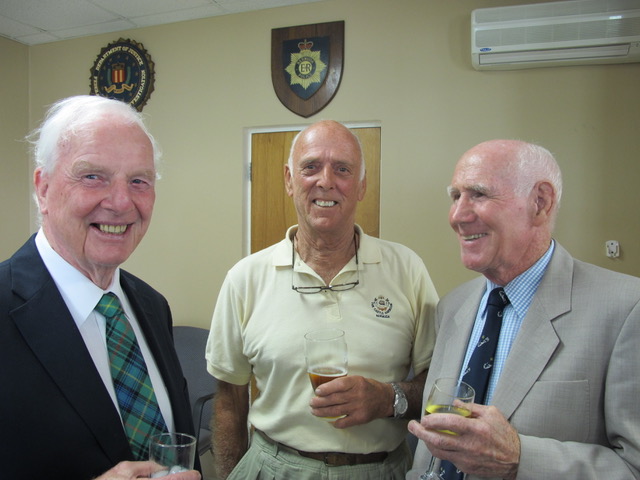
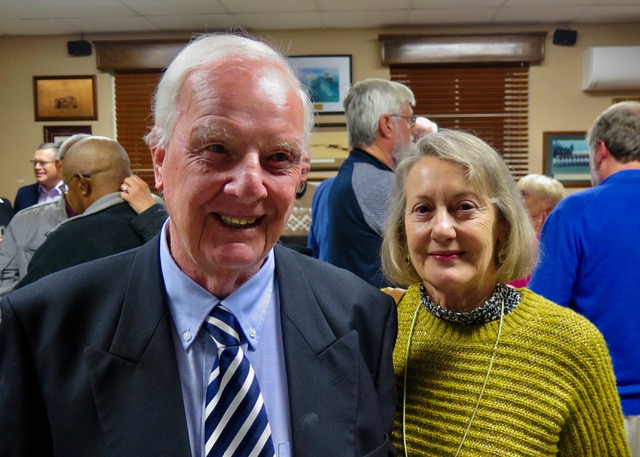
For much of my life I have been indebted to the Bermuda police for bringing me to Bermuda, but for also introducing me to many people in Bermuda most of whom have been helpful in my professional career. I always look back, fondly, on my time in the Police and the many friends I made there. I hope many younger police officers enjoy the opportunities I enjoyed although the environment is now very different to that which existed in the early 1960s.